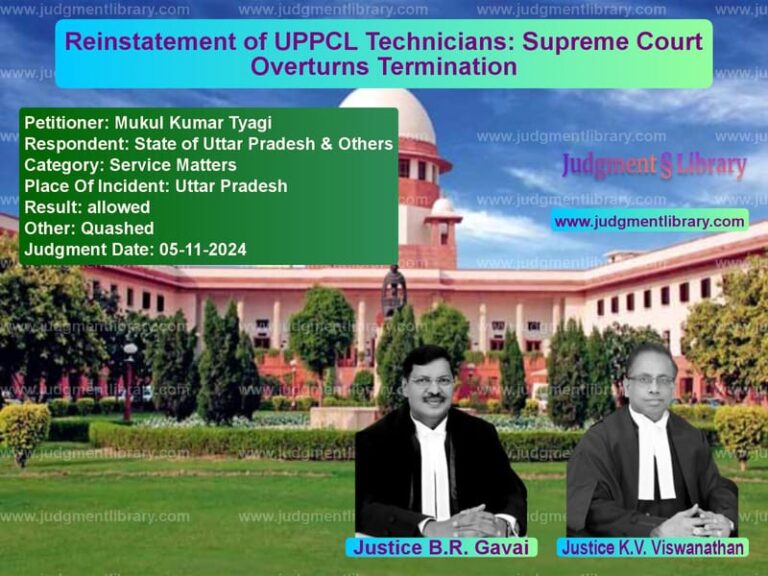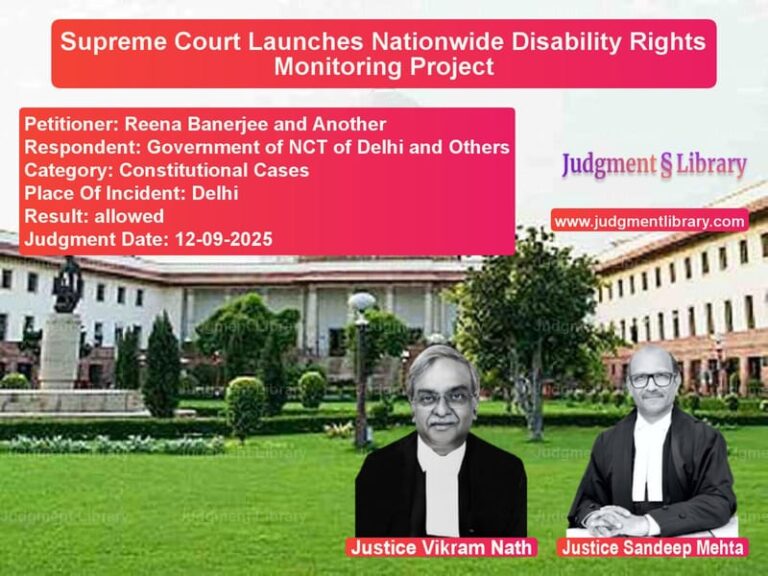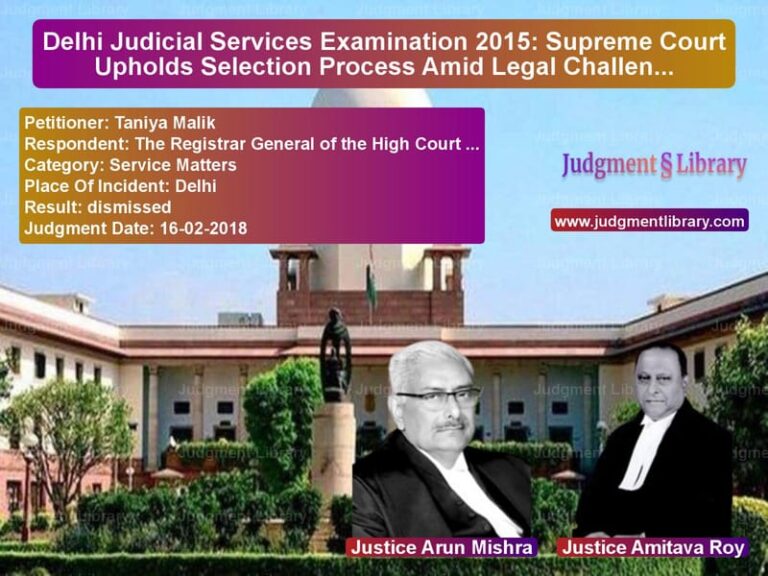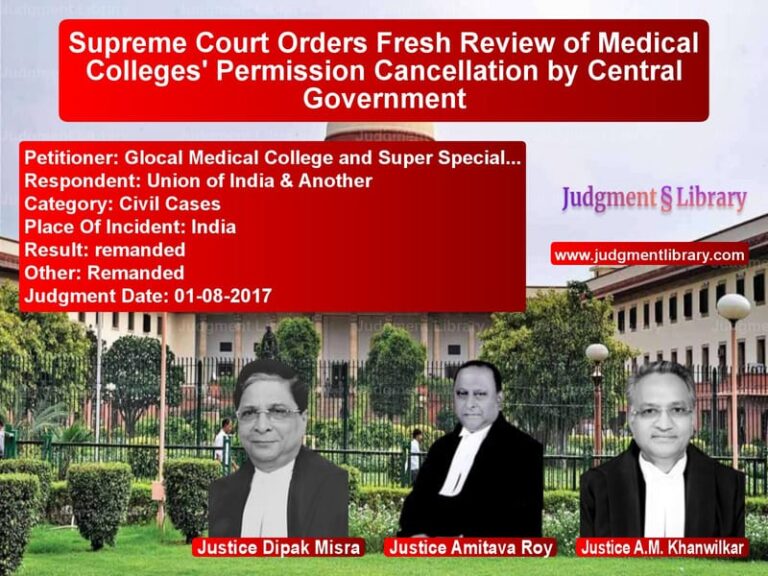Supreme Court Upholds Life Imprisonment in Murder Case: Analyzing the Judgment in Detail
The Supreme Court of India recently delivered its judgment in Criminal Appeal No. 2685 of 2023, in which the appellants Suresh @ Hanumant, Dinesh Kumar @ Khali, and Deepak Kumar @ Chintu were convicted for the murder of Nagender Yadav. The case involved a brutal shooting, and the prosecution relied primarily on the dying declaration of the deceased, witness testimonies, and forensic evidence. The Supreme Court upheld the conviction and sentence of life imprisonment awarded to the accused, dismissing the appeals.
Background of the Case
The case revolves around an incident that took place on the intervening night of May 15 and 16, 2012. The deceased, Nagender Yadav, was at home in Delhi, sleeping alongside his wife, PW-1 Bindu, and their minor son. Around 12:30 AM, PW-1 heard a loud sound that initially resembled a firecracker. Upon waking up, she saw her husband coming towards her in a bent position, holding his stomach in pain. When she switched on the light, she saw blood oozing from his abdomen. The deceased informed her that accused No.1, Dinesh Kumar @ Khali, had shot him, while accused Nos.2 and 3, Deepak Kumar @ Chintu and Suresh @ Hanumant, were also present at the scene.
The deceased’s brother, PW-2 Ram Singh Yadav, and his nephew, PW-10 Angad, who were neighbors, arrived at the scene after hearing the commotion. The deceased was rushed to Sanjay Gandhi Memorial Hospital, where he was referred to RML Hospital. However, he succumbed to his injuries before receiving further treatment.
Conviction by Trial Court and High Court
The Trial Court, after examining the evidence, convicted all three accused under Section 302 read with Section 34 of the Indian Penal Code (IPC). In addition, accused No.1, Dinesh Kumar @ Khali, was convicted under Sections 25(1B)(a) and 27(1) of the Arms Act for illegal possession and use of a firearm. The sentences awarded were:
- Life imprisonment for all three accused under Section 302 IPC.
- Additional two years imprisonment for accused No.1 under the Arms Act.
- Fines imposed on all accused, with default imprisonment terms.
The High Court upheld the convictions, rejecting the defense’s arguments.
Arguments by the Petitioner (Accused)
The defense raised several arguments challenging the conviction:
- Lack of visibility: The defense contended that it was too dark for the deceased to identify his attackers, as PW-1 stated that she had to switch on the light after the incident.
- No recorded dying declaration: The appellants argued that the deceased was conscious when he was admitted to Sanjay Gandhi Memorial Hospital, yet no dying declaration was recorded by the attending doctors.
- Inconsistencies in forensic evidence: The forensic report could not confirm that the bullet recovered from the deceased’s body was fired from the weapon recovered from accused No.1.
- Access to the premises: The defense pointed out that the house had a large iron gate, making unauthorized entry unlikely.
- Lack of independent witnesses: The primary witnesses were the deceased’s wife and brother, raising concerns about bias.
Arguments by the Respondent (State)
The prosecution countered these arguments, asserting:
- Reliability of the dying declaration: The deceased’s statement to PW-1 and PW-2 before succumbing to his injuries was consistent and corroborated.
- Identification of the accused: The deceased personally knew all three accused, making misidentification improbable.
- Corroborative testimonies: PW-1 and PW-2 provided consistent accounts of the incident, strengthening the prosecution’s case.
- Weapon recovery: The firearm used in the crime was recovered at the instance of accused No.1.
Supreme Court’s Observations
The Supreme Court, after reviewing the evidence, made the following observations:
“The evidence of PW-1 and PW-2 on the dying declaration made by the deceased is consistent and very reliable. Their version of the dying declaration has not been shaken in the cross-examination.”
Regarding the forensic inconsistencies, the Court held:
“Once the dying declarations are duly proved, the forensic report’s inability to confirm the bullet’s origin becomes immaterial.”
The Court further dismissed the argument that it was too dark for identification, noting that:
“The accused were well known to the deceased. The presence of a streetlight nearby further diminishes the possibility of misidentification.”
On the common intent of the accused, the Court stated:
“Looking at the evidence on record, Section 34 of IPC has been correctly applied to the facts of the case. From the conduct of the accused persons reflected from the evidence on record, common intention on their part was duly proved.”
Final Judgment
The Supreme Court dismissed the appeals and upheld the convictions, ruling:
“We find no error in the view taken by the Trial Court and the High Court. Accordingly, the appeals are dismissed. The accused are granted one month to surrender for undergoing their remaining sentence.”
The Court also directed that their cases for remission be considered at an appropriate time.
Conclusion
This judgment reinforces the legal principle that a well-supported dying declaration can form the basis of conviction. Despite the defense’s attempt to raise doubts, the prosecution’s case was deemed strong enough to sustain the verdict. The ruling serves as a crucial precedent in cases relying on dying declarations.
Petitioner Name: Suresh @ Hanumant & Ors..Respondent Name: State (Govt. of NCT Delhi).Judgment By: Justice Abhay S. Oka, Justice Ujjal Bhuyan.Place Of Incident: Delhi.Judgment Date: 05-03-2025.
Don’t miss out on the full details! Download the complete judgment in PDF format below and gain valuable insights instantly!
Download Judgment: suresh-@-hanumant-&-vs-state-(govt.-of-nct-supreme-court-of-india-judgment-dated-05-03-2025.pdf
Directly Download Judgment: Directly download this Judgment
See all petitions in Murder Cases
See all petitions in Bail and Anticipatory Bail
See all petitions in Attempt to Murder Cases
See all petitions in Judgment by Abhay S. Oka
See all petitions in Judgment by Ujjal Bhuyan
See all petitions in dismissed
See all petitions in supreme court of India judgments March 2025
See all petitions in 2025 judgments
See all posts in Criminal Cases Category
See all allowed petitions in Criminal Cases Category
See all Dismissed petitions in Criminal Cases Category
See all partially allowed petitions in Criminal Cases Category







